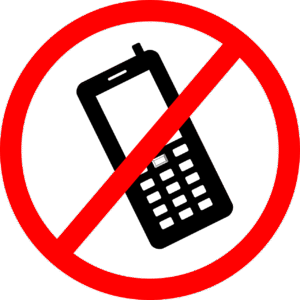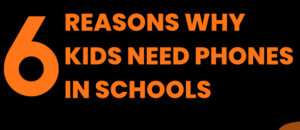After the government banned cell phones in schools this past year, I’ve now had a full year to experience a “cell phone–free” classroom. The school I’m currently at didn’t have major issues with phones to begin with, so the shift didn’t make a dramatic difference in terms of behavior. However, I did feel the impact was in their potential use for educational purposes.
The recent class debate on this topic raised compelling points on both sides. In the end, though, I personally believe that elementary and middle years students should be allowed to have phones in the classroom with clear boundaries and consistent rules in place.
The pro-ban side emphasized five main arguments: phones are designed to capture attention, they harm student well-being, teachers shouldn’t have to be “phone police,” teens struggle with self-regulation, and phones are a major source of distraction. The one article they shared from the National Center for Education Statistics confirms these points with a lot of interesting facts and data driven information. I’m actually shocked that more than 50% of school leaders agree that cell phones in the classroom hurt academic performance.
To be honest, I fully agree with all of these concerns. Still, I believe many of them, though not all, can be addressed through proper classroom management. Establishing rules and routines is a key part of setting up a classroom in the first few weeks of school. When I worked at a previous school where students were permitted to have phones, we implemented a simple routine: phones were placed in a drawer upon entering the classroom. Of course, there was some resistance at first, but consistency and teacher follow-through helped build a routine that worked. I understand this isn’t feasible for every classroom or every teacher, especially if the teacher struggles with managing their own device use, but banning phones entirely feels like punishing everyone for the actions of a few.
6 Reasons Why Kids Need Phones in Schools
My main concern with the ban was less about misuse and more about losing access to a valuable classroom tool (but the 6 Reasons Why was an interesting read from a parents’ perspective). Phones could be useful for assignments and projects, especially when it came to taking photos or videos for presentations. While it was never a requirement for students to use their phones, it was helpful to have them as a backup option when computers were unavailable, or the Wi-Fi wasn’t working. That flexibility is something I genuinely miss.
Ultimately, the decision around phone use is out of our hands as educators. And yes, we’ve managed just fine this past year without them, though at times it’s required more creativity and flexibility. Still, I wonder: if students aren’t taught now, at a young age, how to manage their phones responsibly, when to use them, how they can be used for learning, then when will they learn? In my opinion, teaching responsible use is part of preparing them for the real world.
Great work by all the debaters this week! Enjoy your evening 🙂



Hi Danielle!
Taking a stance and saying that phones should be allowed for elementary and middle school students was a surprising turn! I expected you to suggest that they should be allowed for high school students, as that seems to be a common argument for this topic. However, your points have some truth to them and are very refreshing. If we did take the time to educate our youth on proper cell phone usage, would they be more equipped once they got to high school? As you mentioned, in Saskatchewan, we will not know, as it is not up to educators to decide if phones are allowed in the classroom. But it would be interesting to see how other schools in other provinces handle the issue moving forward. Before the cell phone ban, were you utilizing cell phones in the classroom? If so, how did you use them, and how did you have to adjust your practices after the ban?
All the best,
Daegan
Hey Daegan,
I know what you mean, sometimes I feel like I might be the only one with these views, but that’s okay. I’ve definitely seen cell phones become a challenge for some teachers, but honestly, they often struggled with classroom management to begin with. So, adding phones into that mix just made things worse. That’s why I think this whole topic is so tricky, it really depends on the individual.
To be honest, I didn’t use phones much in my own classroom either. I think I’m more advocating for the option to use them when they’re needed. Our school computers aren’t the best, so students would sometimes use their phones to take pictures or videos and upload them to the computer. Others would listen to music during independent work, face down phones, using a playlist (so they didn’t need to pick up their phones every 3 minutes to choose a new song), and that was way easier than constantly trying to find songs on YouTube.
I guess I’m mainly speaking from the middle years perspective, since that’s the age group I teach. When the ban was introduced, we just adapted. It came with a few small hiccups, and we had to adjust some assignments when tech wasn’t working properly but it was fine.
Thanks for the great questions, there’s honestly SO much to unpack with this topic, and I’m not sure I will ever know the right answer! 🙂
I completely understand where you’re coming from, and I agree that cell phones used to be a great backup tech! While I think Chromebooks are a good cell phone replacement, they really only act as a true replacement when they have no complications and are available in a one-to-one ratio for students. I didn’t even think to consider what classrooms might look like now if they don’t have access to that much up-to-date tech for their students. I can imagine it is time-consuming and, in situations where resources are limited, involves some fighting over the classroom technologies.
I agree that there is so much behind this topic, and I’m not sure I’ll ever have the right answer either! I can assume my opinion will continue to change the more I learn from people’s personal experiences, like yours, and as I gain more experience in education. Thanks for your reflections!
Dani, I am guilty as the parent who thinks they should be allowed their phones…. Now hear me out. I do NOT think they should be allowed to take them out during class times however, the article you posted on the 6 reasons why they should be allowed them laid out ALL my reasons as a parent why I want my kids to have their phones on them. I have 3 very busy kids. Competitive sports right after school, my oldest needing to watch my youngest, many hands to help with pick ups and drop offs, working shift work at times…… You know the craziness of my household. I am often left to call the school (sometimes multiple times) saying can you please tell Millie that I am running late and uncle will be picking her up at school for her activity or can you please tell Averie that she needs to walk Arlowe home as we had a emergency at the hospital and I cant get out in time for pick up…… My school ROCKS and never have they made me feel bad for passing on messages to the girls. However, if the girls had their phones I could message them and know they received it. What is more inconvenient to the classroom, my daughter checking her phone a couple times a day in her locker or having someone knock on the classroom door to pass her a message a couple times a week… and yes a week….. our lives are busy and every changing!
Hi Danielle,
Great post!
The article on why students need cell phones was really interesting! From instant communication to GPS tracking for parents was something I could relate to. Even though I don’t have teenagers anymore (I have three young adults living in different cities), I rely on them having their phones for my own peace of mind.
The article points out that we’re beyond asking whether phones belong in schools-they are already here. The focus now should be on teaching students how to use them responsibly and mindfully. As an educator, if I choose to allow phone use in my classroom, it is my job to clearly outline expectations and teach and model appropriate use in an educational setting. More importantly, I need to consistently monitor their use and enforce digital boundaries.
At the school I was at this past year, not every student had access to a school device, so there were several times when my students were allowed to use their phones. Some days I collected phones at the start of class, and on other days my students were able to use them to complete a task. I am not going to lie, it was exhausting, but that is part of the responsibility that comes with using technology in the classroom.
Although there were bumps early on, a lot of pushback and questions about the rules, my class and I eventually figured it out. We got to a point where they knew and understood the expectations , but it still required constant reinforcement and reminders to keep things on track.
Thank you for sharing your insights!
Leanne